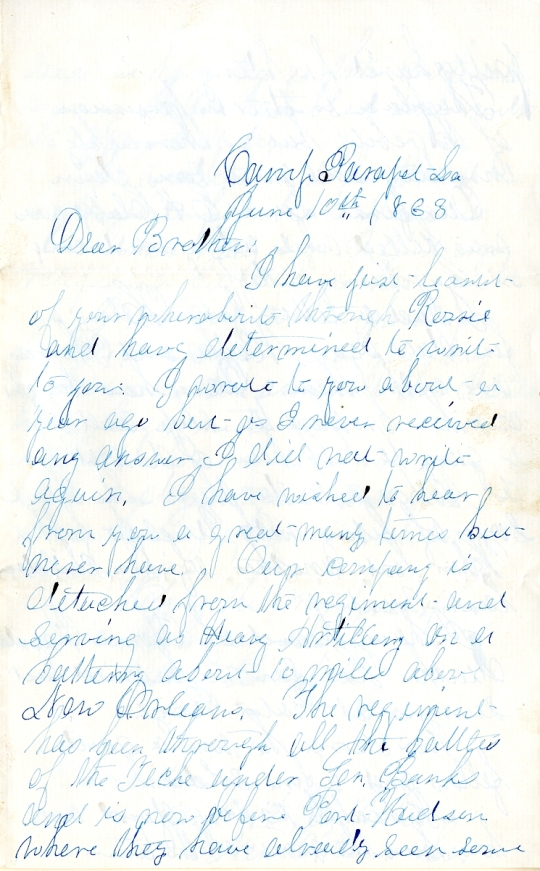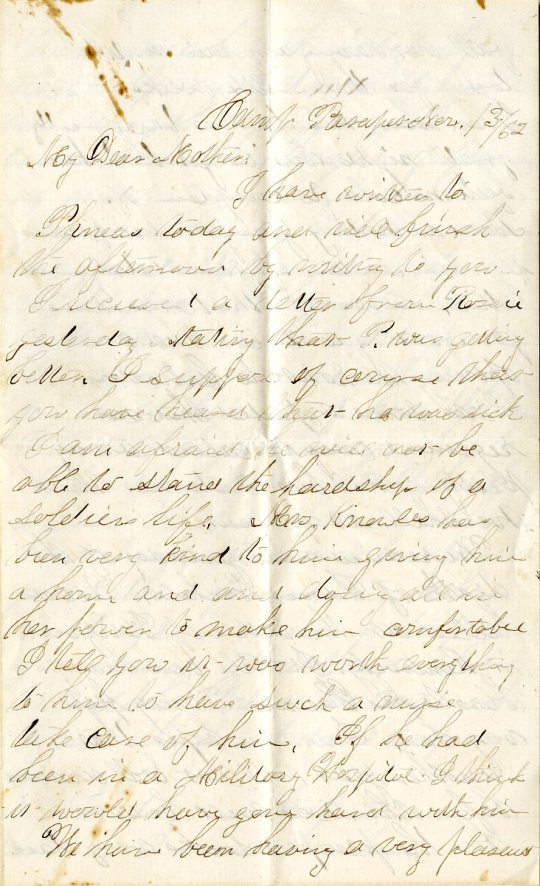Phineas was not Jerry’s only brother, he had an older brother, George W. George W. Flint, also from River Falls, was in Company A of the 20th Wisconsin Infantry. Unknown to Jerry, George had just died from disease on May 10, 1863, in Springfield, Missouri.
The original letter is in the Jerry E. Flint Papers (River Falls Mss BN) at the University of Wisconsin-River Falls, University Archives and Area Research Center.
Camp Parapet La
June 10th 1863
Dear Brother,
I have just learned of your wherabouts [sic] through Rossie [Roswell V. Pratt] and have determined to write to you. I wrote to you about a year ago but as I never received any answer I did not write again. I have wished to hear from you a great many times but never have. Our company is detached from the regiment and serving as Heavy Artillery on a battery about 10 miles above New Orleans. The regiment has been through all the battles of the Teche¹ under Gen. Banks [Nathaniel P. Banks] and is now before Port Hudson where they have already seen some pretty hard fighting.
The place is still in possession of the rebels but is thoroughly invested and must come clean.
Our first Lieut E A Clapp was was [sic] killed while acting aide-de-camp on Gen. Sherman staff [Thomas W. Sherman].
I had a letter from Helen a few days ago. Mother and Phineas are with them. Dean has bought out his brothers tin shop and Phin is going to help him. I do not know as Mother will stay there. She thinks some of living with Uncle J’s folks. Helen lost another of her children last winter.²
I have heard of Thomas Randall’s death. His son we buried [sic] last summer at Baton Rouge. Poor George he was a good fellow and a fine soldier.³
My health is very good and has been the most of the time since we have been in this God forsaken country. I am troubled some with the Fever and Ague.
The weather is so hot that it is almost impossible to stand it. As Uncle Healy4 says “I can’t enjoy religion” a bit it is so hot.
I will not write much now for this may never reach you but if I receive an answer to this I will write longer next time.
Write soon if it is not more than a dozen words and give me a history of your military career.
Hoping this may find you well I remain as ever
Your Brother
Jerry
Direct to
Co. G. 4th Reg. Wis Vol
New Orleans La.
1. Jerry is referring to the Bayou Teche Campaign, a brief military campaign in April and May 1863 in Louisiana. Union forces were trying to trap Confederate units between the Bayou Teche and the Atchafalaya River.
2. Helen is Jerry’s sister. Dean is Royal L. Dean, her husband, who becomes a tinner by trade. Phin is Jerry’s brother Phineas Flint. Jerry, Phin, and Helen’s mother was Jerusha Pratt Flint.
3. Thomas Randall, from River Falls, was in George Flint’s company (Company A of the 20th Wisconsin Infantry); he died March 30, 1863, in St. Louis, Missouri, at age 45. George T. Randall, from River Falls, was in Jerry’s company (Company G or the 4th Wisconsin Infantry); he died August 7, 1862, in Baton Rouge, at age 24.
4. Possibly Manly Healy, from River Falls, who does not seem to have been an actual relative.








